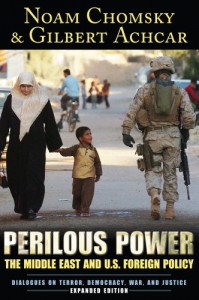Thus Spake Dustin
I love reading about Eastern Orthodoxy, scripture, and nonfiction works that challenge me to expand my view of the world.
Review of Perilous Power

Noam Chomsky and Gilbert Achcar, Perilous Power: The Middle East and U.S. Foreign Policy; Dialogues on Terror, Democracy, War, and Justice, Expanded Edition (Boulder: Paradigm Publishers, 2009). Pp. 319. $29.95.
This book is a fantastic source of information for those who want to understand the current political makeup of the Middle East. The book derives from a three-day conversation in January of 2006 between Chomsky and Achcar, which was moderated by Stephen Shalom. The final text was edited, and footnotes were profusely added after the conversations. The edition I read has an epilogue, which was written six months later (July of 200); and a postscript, which was written two years (2008) later. Needless to say, it's now 2014, and another updated could be written.
Topics covered include: 1) terrorism; 2) fundamentalism and democracy; 3) U.S. foreign policy in the Middle East; 4) the War in Iraq and its aftermath; 5) the War in Afghanistan and its aftermath; 6) the situations of Iran, Saudi Arabia, Syria, the Kurds (of Iraq and Turkey), and Lebanon; and 7) the Israel-Palestine conflict.
The conversation between these two brilliant scholars is eye-opening. Their major premise is that the U.S.'s goal is to control the world's economy (i.e., power). To do that they need to control the oil supply, which would give them power over other countries (including European countries) because the U.S. could threaten to 'turnoff the oil.’ They explain how this motivation leads the U.S. to: undermine democracy (all over the world - including in the U.S. itself); go to war with and invade with certain countries (Iraq), but not others; topple particular leaders, but not others; and install some leaders who are actually worse for their countries than the leaders who were removed.
In fact, they show how the current policy of the U.S. is actually anti-democracy. For example, the U.S. worked against free elections in Venezuela and Nicaragua (pg. 49-50). They also ask if America can truly be called a democracy when polls often reveal that Americans are at odds with congress on certain policies (e.g., going to war, universal healthcare).
My favorite section of the book was the section on fundamentalism (pp. 27 ff.) - perhaps because I'm in the religion 'business.' Their argument is that from the turn of the 20th century onward, there was a strong tendency towards secular nationalism rising in the Middle East. In fact, it sounds as if this nationalism was very progressive in many respects. However, U.S. government backed Islamic fundamentalists in order to bring instability to the region - or, at the very least, opposed secular nationalists, which lead to a vacuum that was filled by fundamentalists. The U.S. feared that secular nationalism would lead to strong and powerful Middle Eastern countries that would use the oil for their own economic development. In order to keep control over the oil (and also from keeping the U.S.S.R. and Europe from getting control of the oil), the U.S. consistently backed the fundamentalists, who created instability and prevented powerful Middle Eastern countries from developing.
The discussion goes from Middle Eastern fundamentalism to U.S. fundamentalism, which has only recently become a political force. Their argument is that C.E.O.s and other powerful businessmen foster Christian fundamentalism in order "to shift the focus of many voters from the issues that really affect their interests (such as health, education, economic issues, wages) over to religious crusades to block the teaching of evolution, gay rights, and abortion rights" (pg. 31).
Chomsky continues by saying, "These [the religious/social issues] are all issues, for example, about which CEOs just don't care very much. They care a lot about the other issues [health, education, economic, wages]. And if you can shift the focus of debate and attention and presidential politics and so on to questions that are quite marginal for the wealthy - questions of, say, gay rights - that's wonderful for people who want to destroy the labor unions, construct a social/political system for the benefit of the ultrarich, while everyone else barely survives" (pg. 31). In other words, they are arguing that Christian fundamentalism is actually hurting the majority of the population (main street), all while making a very small percentage very rich (wall street).
In general the book is very readable. The reason I didn't give it the full number of stars available is that it can get very deep very quickly - to the point of name-dropping. It would have been helpful to have glossary of terms and people, a map, a timeline of events, and perhaps an appendix that quickly summarized the history and movements within each of the countries discussed. In all, however, with the current situation, I would highly recommend everyone reading this book.



